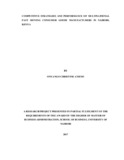| dc.description.abstract | The environment in which organizations operate in is dynamic and this requires that the organization’s leadership must think strategically and hence formulate and implement strategies that will enable the organization to achieve its vision and mission and in effect perform better than competitors. Competitive strategies entail the moves that an organization puts in place to deal with competitive pressure from the environment, attract buyers and make its position in the market better. This implies that to gain competitive advantage, organizations must adopt tactics that enables the organization to outwit other players. Performance is a measure of the organization’s efficiency and effective. It denotes the level of returns on shareholders’ investment. Maximization of shareholders wealth is the key objective of any organization and therefore it is an agenda in every business meeting. The needs of the customers keeps changing making the players in the Fast Moving Consumer Goods industry to be strategic to remain relevant in the market and compete effectively. The objective of the research was to determine the effect of competitive strategies on performance of multinational Fast Moving Consumer Goods Manufacturers and the challenges faced in implementing the strategies. The study was anchored on industrial organization economics theory, resource based view model and game theory. The research was a descriptive cross-sectional census survey. Data was collected from 20 multinational Fast Moving Consumer Goods manufactures in Nairobi, Kenya. Questionnaires were used to collect data which was analyzed using descriptive and inferential statistics. The research established that costing of all products, providing products that meet customer needs through continuous research and development, and striving to remain relevant in the market were the main aspects of cost leadership strategy, differentiation strategy and focus strategy that were used. The study also established that net profit, sales trend and market share were indicators of performance. Further the research established a significant association between cost leadership strategy and sales trend, differentiation strategy and sales trend and focus strategy and net profit. In implementing competitive strategies, frequent changes in government regulations, financial constraints, high implementation cost and complexity of customer needs were the challenges faced by the multinational Fast Moving Consumer Goods manufacturers in Nairobi, Kenya. | en_US |



